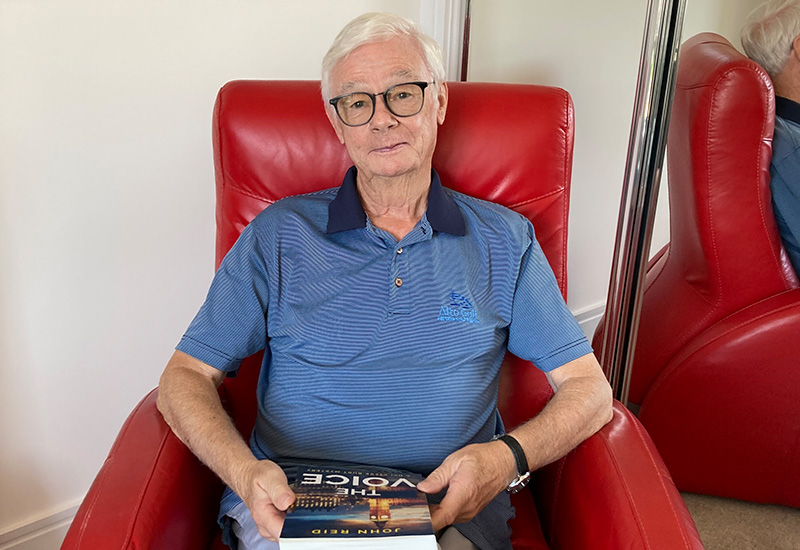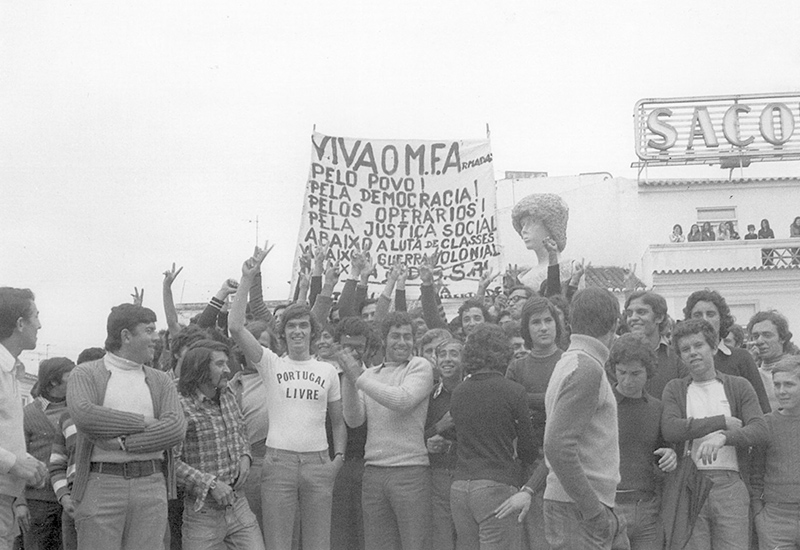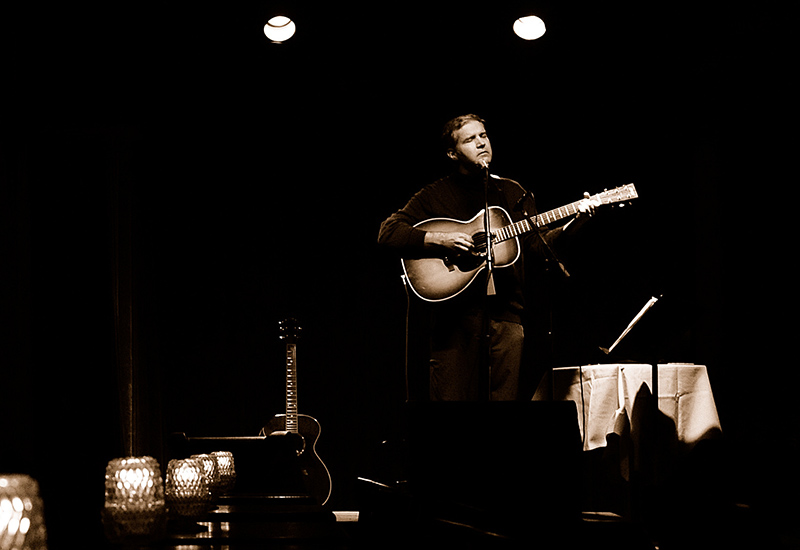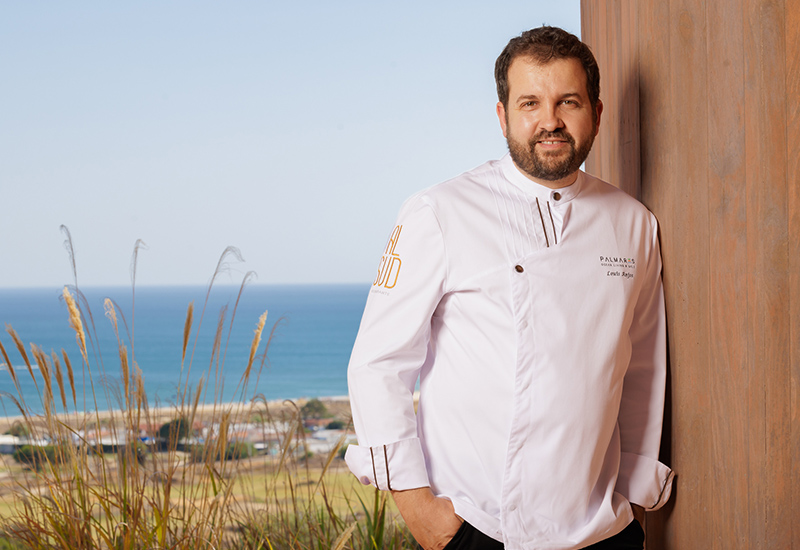Q: Many decades ago, I used to play “Battleships” with pen and paper, and I always loved the eagerness of the very first (absolutely blind) shot, with (sometimes) its totally unexpected outcome. So, Mr Reid, allow me to shoot the first question: How did your sons accept their “half-sibling” DCI Steve Burt?
John Reid: My sons don’t view Steve Burt as part of the family, although our younger son has taken over the role of marketing manager for the Steve Burt series. I always told them that I would become an author one day, but I don’t think they believed me.
Q: When did you discover that crime fiction was your calling?
J.R.: I carried around the first DCI Steve Burt plot in my head for many years. For some reason, the work the police do in solving crimes has always interested me. Although in my novels, a lot of police procedure is assumed, it nonetheless shows the interest and fascination I have had in solving mysteries. I can’t see myself ever writing anything other than crime fiction.
Q: What advice would you give to an aspiring author of detective stories looking to get published?
J.R.: Just to keep trying. It is best to have an original plot in order to keep the reader interested. Any aspiring author should seek to develop their plots slowly and systematically, but all their writing should reach a crescendo during the last few chapters when the crime is solved. Try and keep the reader guessing as to who the villain might be and drop false clues during the story.
Q: Do you base your characters upon real people and shape them around individuals you know?
J.R: All my characters are fictitious. Friends occasionally ask if their name can be included in my next novel, so sometimes, people will identify themselves by their name but certainly not by their character in the book.
Q: How do you deal with bad reviews of your books, if any?
J.R: I have not had bad reviews but reviews that have been critical of the description of one of my characters, particularly in the early days. These reviews, however, didn’t criticise the storyline or say they didn’t enjoy my work, simply that they disagreed with one of my descriptions of a character. I appreciate everyone has an opinion and are free to comment as they wish.
Q: How do you pick the titles for your books?
J.R: At the beginning of The Forgotten Gun, the title picked itself because the storyline is about how murders are committed using a forgotten gun. After reading the proof of book two, The Auction, a friend of mine suggested that I should consider commencing each title with the word “The.” This is the format I have stuck to, but I do sometimes find it difficult to come up with titles that convey the book’s content. To date, the titles have come from the underlying theme of each novel.
Q: Do you have an agent and did you ever consider expanding internationally by translating your books into other languages?
J.R: No, I don’t have an agent. As a new author breaking into the complicated world of book publishing and sales is not easy, and we rely heavily on the publisher’s ability to assist us. I was advised early on that agents can be expensive and don’t always perform well.
As to international sales, we are selling successfully in the USA, the Far East and Australia but only into English-speaking communities. We would hope that the success of the series would persuade the publisher to have my work translated into other languages. Whilst on the subject, it has also been suggested that the DCI Steve Burt series would do well as a television series but again, finding the right contact within the industry is difficult.
Q: “Any resemblance to actual persons, living or dead, or actual events is purely coincidental.” Did it ever happen?
J.R.: I deliberately avoid creating characters who may have resembled actual persons, locations or events. I feel I have more freedom to develop my characters if I am not constrained by actual people. However, I was contacted by a gentleman who was called Steve Burt, who, until he retired, was a serving Metropolitan police officer. This was a pure coincidence, but the coincidence grew when he told me his partner in the Met was called John Reid. Unbelievably he has a brother who lives in the Algarve. It’s a small world.
Q: Why did you choose to settle in the Algarve, and has your being settled in Portugal made a difference in your stories?
J.R: My wife and I first came to the Algarve 12 years ago and bought a holiday home. After a few years, we decided to buy a larger property with a view to spending more extended periods here. That has expanded so that we spend a lot of time here in the Algarve. Writing in Portugal makes little difference to my storylines. The internet gives me access to any research I feel I need to do. Although because of our friendly, mainly retired community, two of my friends act as sounding boards for my stories as I develop them. I think this would be difficult to find in the UK.
Q: I know that you are a devotee of golf. Does this noble sport have its place in your books?
J.R.: To date, I have not used golf as a background to any of my storylines. It doesn’t mean to say that in a future novel, golf may become part of the story, but there are few murders committed on the golf course, apart from the scores.
Q: Is there any question I didn’t ask which you would like to answer but have never had the chance so far?
J.R: You should note that the books can be read in isolation and without necessarily having read the previous one. I have deliberately engineered my writing so that each novel stands alone but retains the continuity of characters.
Q: What is your message to the readers of Tomorrow Magazine?
J.R.: I hope that your article encourages the magazine’s readers to at least consider reading my work. Various reviewers have described my novels as page-turners and make excellent holiday reading, especially with the weather in the Algarve.
He is also on Twitter, Instagram and Facebook, either as DCI |Steve Burt or as John Reid Author.
Dan Costinas is an astute globe-trotter, former diplomat, avid bibliophile, and soon-to-be-famous writer & translator whose choice was to retire in Algarve, putting in his two-pennies-worth on the best books he reads.
The Forgotten Gun by John Reid

I admit I haven’t heard of a similar performance before, and I couldn’t imagine it being possible: six novels written and published in only twelve months – totalling 1681 pages! And there is one more curious thing about the debut book: The Forgotten Gun, clearly the first in the series, was published on the 31st of August 2021, while the second one, The Auction, was published more than two months previously, on the 10th of June! A complete mystery to me.
After reading several hundred crime fiction books over the years, I can assure you that every inch of Mr Reid’s plot is original. But, out of respect for those who haven’t read it yet, I’m not going to spoil the pleasure of uncovering the mystery and the twist for themselves.
The purpose of the few hand-picked short quotes below is to illustrate the storyline’s high standard and to sample the enjoyment of reading this book.
“He knew people with nothing to hide trusted authority. His plan had come together. All he had to do was execute it.”
The reader meets the killer from the very beginning, without the possibility of identifying him and without the story becoming predictable. Apart from the book’s opening pages, he appears again in four other chapters: Nine, Sixteen, Twenty-Seven, and Thirty-One.
“It’s my job to put something together that’ll look good to our political overseers. I’m setting up new fictitious units now and staffing them with the dead wood we want shot of.”
“In democracy, politics is not necessarily a decent thing but mainly a necessary evil. Yet sometimes it seems too much when this evil becomes omniscient-omnipotent-omnipresent, and when it is politically more correct to cover the corrupt police officers or make up fictitious departments to get rid of the awkward ones.”
“Are we saying this TPPP outfit deliberately took investors’ money knowing the property boom was about up and we think they’ve stashed the cash away somewhere where they hope it can’t be found?”
Besides dealing with a murder case that is impossible to solve, DCI Steve Burt and his creative team are entangled in a dishonest mesh of greed, fraud and tens of millions of pounds in a sophisticated international money laundering scheme.
There is something else to like about how this book was engineered: Mr Reid seems to know exactly when we need a break, so he creatively uses the quiet periods to develop the characters and prepare the subtle plot points.
If I were to assess the book as a whole, on a scale from 1 to 100, I would say 99.99. I can already hear you asking: “What’s wrong with 0.01?” To all intents and purposes, nothing is wrong; it is more a matter of gustibus than anything else: to be honest, I do not quite like the front cover design. Without being a cover creator, I think the city landscape and human silhouettes used for the background are all right, but using four different font types/sizes and three colours for the text was too much, it damages the appearance. “Don’t judge a book by its cover” so the saying goes. I usually don’t, but when a 5-star book doesn’t have a 5-star first cover, I cannot keep my mouth shut.
If, after this wordy review, you still want to discover John Reid’s The Forgotten Gun, you can find it on Amazon.es from €3.83 (Kindle) up to €12.16 (paperback) and €15.96 (hardcover).














